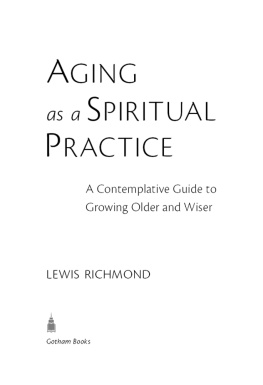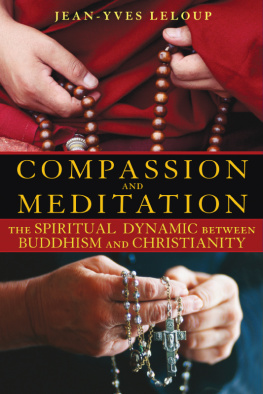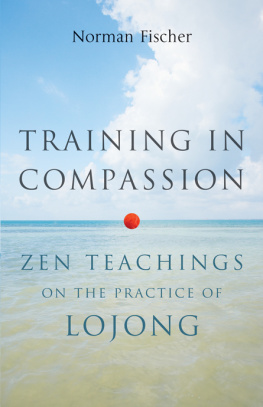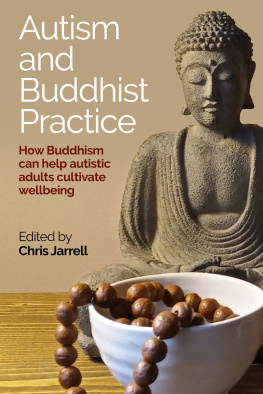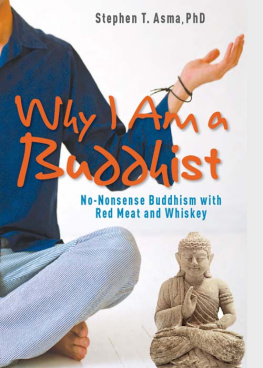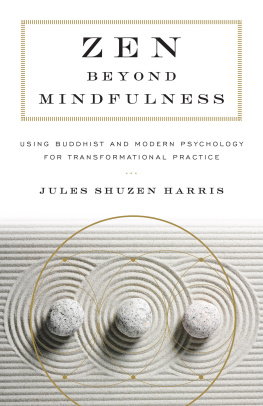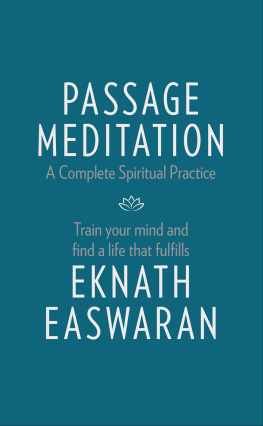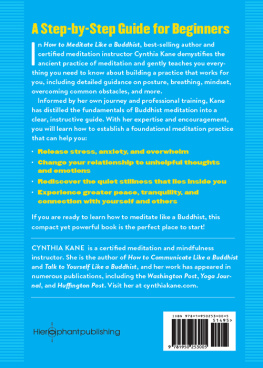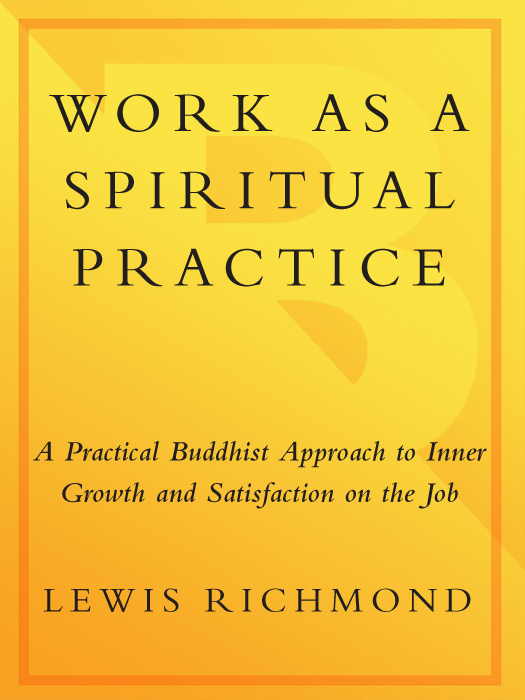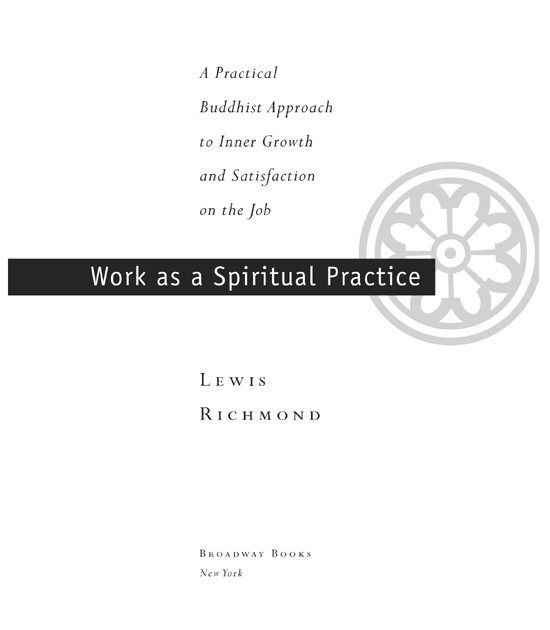Praise for Work as a Spiritual Practice
Work as a Spiritual Practice is full of excellent, wise, simple advice to transform work into awakening. Lewis Richmond really shows how Right Livelihood is possible in almost any job. Bravo!
Jack Kornfield, author of Buddhas Little Instruction Book
Richmond gives us tangible ways to recognize meaningful moments of our work lives and value those moments. Only by doing so can we begin to see the magic in events that are otherwise mundane.
Rocky Mountain News
Richmond does an excellent job of explaining the principles of Buddhism and relating them to the workplace. The book is filled with illustrative stories that make the reading enlightening for those seeking more than just a paycheck.
Washington Times

A hardcover edition of this book was published in 1999 by
Broadway Books.
WORK AS A SPIRITUAL PRACTICE . Copyright 1999 by Lewis Richmond. All rights reserved. No part of this book may be reproduced or transmitted in any form or by any means, electronic or mechanical, including photocopying, recording, or by any information storage and retrieval system, without written permission from the publisher. For information, address Broadway Books, a division of Random House, Inc., 1540 Broadway, New York, NY 10036.
BROADWAY BOOKS and its logo, a letter B bisected on the diagonal, are trademarks of Broadway Books, a division of Random House, Inc.
Grateful acknowledgment is made for permission to reprint the following:
: Permission granted by Ann Landers and Creators Syndicate.
: From Letters to a Young Poet by Rainer Maria Rilke, translated by Stephen Mitchell. Copyright 1984 by Stephen Mitchell. Reprinted by permission of Random House, Inc.
: From Healing Anger: The Power of Patience from a Buddhist Perspective by H. H. the Dalai Lama, 1997, Snow Lion Publications, Ithaca, NY.
: From The Farther Shore by Don Gifford. Reprinted by permission of the Atlantic Monthly Press.
Library of Congress Cataloging-in-Publication Data
Richmond, Lewis, 1947
Work as a spiritual practice: a practical Buddhist approach to inner growth and satisfaction on the job / by Lewis Richmond.
p. cm.
1. Religious lifeBuddhism. 2 WorkReligious aspectsBuddhism. 3. BuddhismDoctrines. I. Title.
BQ5400.R53 1998
294.3444dc21 9830814
eISBN: 978-0-307-87472-6
v3.1
To
my teacher and
lifelong inspiration
SHUNRYU SUZUKI ROSHI

Contents
PART ONE: I NTRODUCTION
T HE S HINY B LUE G RASSHOPPER
The world is full of spiritual opportunity, symbolized by the shiny blue grasshopper sitting on the Buddhas head, or your coworkers head, or your own head. Where is the grasshopper now?
A koan is a spiritual question or problem. We neednt look afar for such questions; everyday life is full of them. Even the ringing phone presents us with spiritual opportunity. The next time the phone rings, the person on the other end of the line could be you.
Spiritual practice is not a rehearsal but an end in itself, an activity that changes us inside and reverberates in the soul. It is a way to refine and develop our character, which is the deep, stable part of ourselves that others can rely on. Character counts.
The Energy Wheel is a map of our mental and emotional experiences. Divided into four sectorsConflict, Inspiration, Accomplishment, and Stagnationit teaches us that moment after moment, day after day, for the whole of our life, we move around and through the Wheel.
Even in the most frenetic job, we can learn to cultivate and maintain an awareness of the body and breathing, establish small rituals of care in our movementswhile walking down the hall, picking up the phone, or talking in a meetingand create a self-mantra to focus our awareness.
Worry can be exhausting and destructive. But it can also be creative. Just as fear is courage in the making, worry is wisdom in the making. Worry allows us to explore the practice of Raising the Question.
Anger is hot truth. By using practices such as the Voice of Truth, the Half Smile, and Visualizing Forgiveness, we can put some space around our anger and, when necessary, take strong countermeasures to redress an injustice without being swept away by our emotions.
Meditation, besides being an excellent antidote to stress and worry, focuses on the fundamental spiritual questions: Who am I? What do I really want? Traditional meditation practices of sitting, standing, and walking can be adapted to the busy workplace, one minute here, one minute there. Though the water of meditation seems to disappear into the sand, deep below, the roots of our spiritual tree are being watered.
Most jobs are boring some of the time. Some jobs are boring all of the time. The time spent commuting to and from work is an excellent opportunity for practices such as Listening Without Judgment and Driver Seeing. The Existential Toll-taker, the Worlds Greatest Receptionist, and the Taxi Professor show us that we can not only do the job, but also create the job, with lightheartedness and good humor.
Failure is not always failure. And even when it is, it can be a strength, not a weakness. Through the practices of the Energy Shrine and Uplifting Another, we can find, within seeming failure, the seeds of future success.
When we are discouraged, our ordinary resources for coping are at a standstill. Is there a part of ourselves that cannot be defeated? Spiritual intention is a sustained effort to maintain our direction without expecting any result. Through the practices of Repetition, Patience, and Making Your Own Luck, we can move through discouragement and sustain our deeper life.
Is there a legitimate place for worldly ambition in the spiritual life? When is ambition fruitful, and when is it just a blind desire for more? The practices of Truthful Feeling and Truthful Effort can help us distinguish between ambition that fulfills us and ambition that defeats us.
Though all the great religions are critical of money, money is what makes a job a job. The Meditation on Moneyusing two bills, a one-dollar bill and a hundred-dollar billexplores how thoroughly money is an inbred creation of the mind. And by changing the way we use our time in the workplace, we can, for a moment at least, strike a blow against the dictum that time is money and instead assert that time is love.
Buddhism teaches that the first step in being truly able to forgive another is to forgive ourselves. By practicing the Friend in the Heart meditation, and by finding opportunities to practice apology in the workplace, we can harness the transformative power of forgiveness, even with our adversaries.
Maybe the most spiritually fulfilling exercise in your workplace is not to find ways to cope with the job you have but to find a better one. By cultivating the Inner Entrepreneur, by raising the right questionsAm I ready? What is my plan? What if I fail?and by practicing patience and humility, quitting might indeed be a spiritual practice for you.


